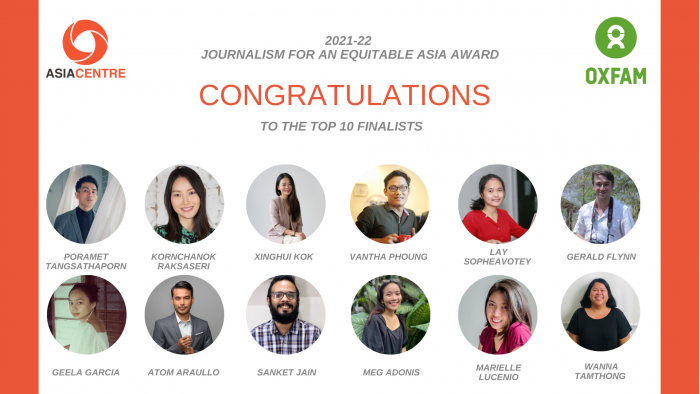Journalists recognized for stories highlighting inequality in Asia
Press Release
The COVID-19 pandemic impacted the lives of millions of Asians, but poor and vulnerable Asians saw the worst of its impacts. The stories submitted for the third round of Journalism for Equitable Asia award revealed how across Asia, women, ethnic, religious and gender minorities are experiencing a worsening of inequality.
The award ceremony was jointly organised on 15th March 2022, by Oxfam and Asia Centre to recognize the work of journalists who highlighted the plight of Asians experiencing worsening inequality. Over 150 journalists from Bangladesh, Cambodia, China, India, Indonesia, Malaysia, Myanmar, Nepal, Pakistan, Philippines, Singapore, Thailand, Timor Leste, and Vietnam were nominated for the award.
The award ceremony, which was held both in-person and live-streamed over social media, was attended by journalists, media academics, civil society actors, and others from Asia and beyond.
Speaking at the ceremony, Oxfam in Asia Regional Director John Samuel recognized the important role played by journalists in highlighting issues of gender, economic inequality and injustice. “As the voice of the people, journalists have the skills and visibility to draw public attention to gaps and loopholes in social infrastructures and how vulnerable people are experiencing inequality. However, in these unprecedented times, journalists face incredible challenges. Through this award we hope to recognize the courage of journalists writing for an equitable Asia,” he said.
Asia Centre Regional Director Dr. James Gomez in his opening remarks said ensuring re-employment post COVID-19 will be key to slowing down ever increasing inequality. “As countries begin to declare themselves endemic, they should also announce measures to support vulnerable communities get back on their feet. Policies such as taxing the rich to support the poor are essential to close the widening inequality gap,” he said.
Out of 150 submissions received, 15 journalists were selected for the award, with top three journalists receiving cash prizes.
The first prize was awarded to Atom Araullo from the Philippines for his article ‘The Hunger Pandemic’ which told the story of growing hunger and food insecurity in Manila during the COVID-19 pandemic. Araullo’s powerful writing brings to life the experiences of Manila’s poor who struggled to feed themselves during lockdowns and increasing unemployment.
Marielle Lucieno from the Philippines secured the second prize for her article ‘The gold trap: COVID-19 is pushing more Filipino children into hazardous work’. Lucieno tells the story of a village in the Philippines where many children who were saved from child labour were forced to return to work during the COVID-19 pandemic.
Phoung Vantha, Lay Sopheavotey and Gerald Flynn from Cambodia were awarded the third prize for their article, ‘Locked Down and Out of Work: Desperation Sets in among Garment Workers.’ The article highlights how unequal access to sanitation services and clean water in garment factories led to the outbreak of COVID-19 in factories, where factory owners were under no obligation to provide support to employees during lockdowns.
Other top 10 finalists of this year included: Kok Xinghui from Singapore for her article, ‘Coronavirus: why vaccine inequality in Asia threatens the world’s recovery,’ Meg Adonis from the Philippines for her article, ‘Yet another challenging year for public school teachers,’ Poramet Tangsathaporn and Kornchanok Raksaseri from Thailand for her article, ‘Patpong ‘on its last legs,’ Lay Sopheavotey from Cambodia for her article, ‘Trade Unions: Women Workers Need Support During Pregnancy and Postpartum,’ Sanket Jain from India for his article, ‘Covid 19 and The Desperate Lives of India’s Sugarcane Workers,’ Wanna Tamthong from Thailand for her article, ‘How to Make a Killing: Overpriced Covid-19 Tests for migrant labourers,’ and Geela Garcia from the Philippines for her article, ‘Who peels your garlic: Inside Manila’s informal economy.’
While giving closing remarks, Asia Centre Executive Director Dr. Robin Ramcharan congratulated the finalists and praised all journalists who highlight the issue of inequality in their work. He said that as countries turn to an endemic stage, special attention should be paid to the pace of re-employment of vulnerable communities as well as their wage levels. Dr. Ramcharan said the work of journalists reporting on how governments address this issue would be important in the months ahead.

